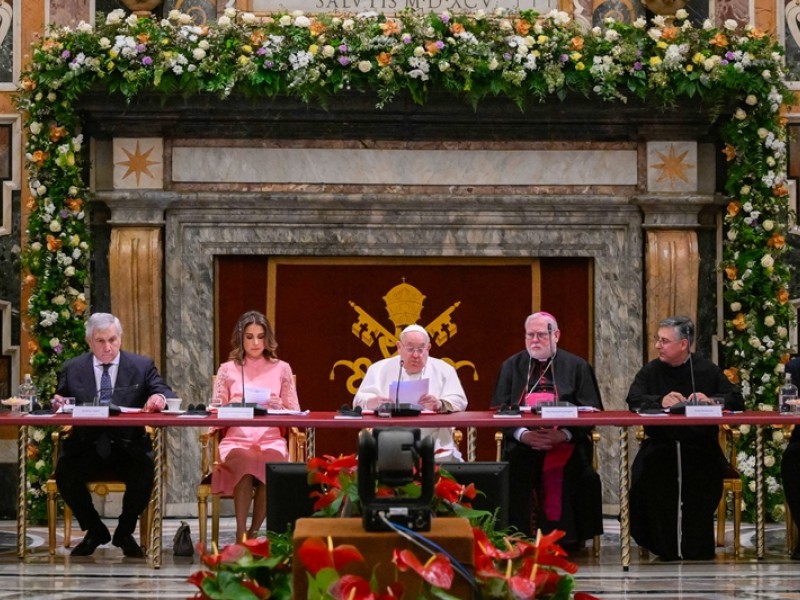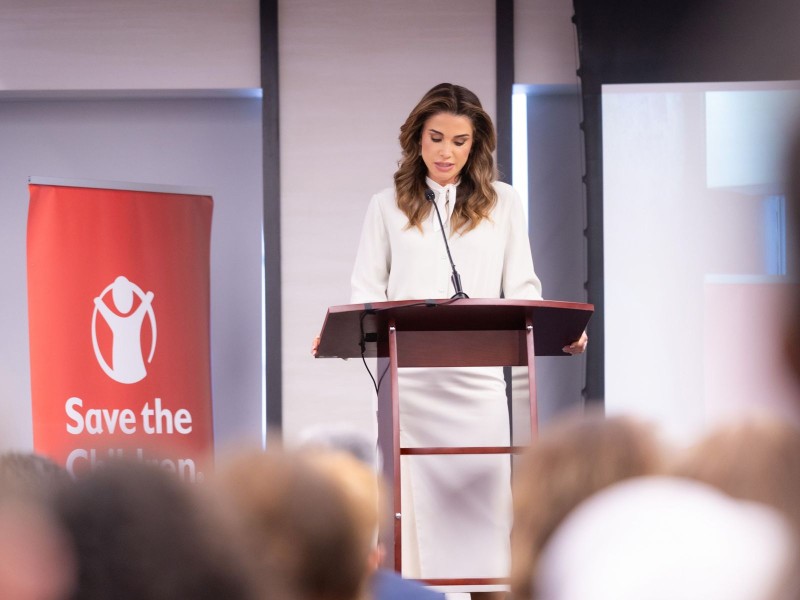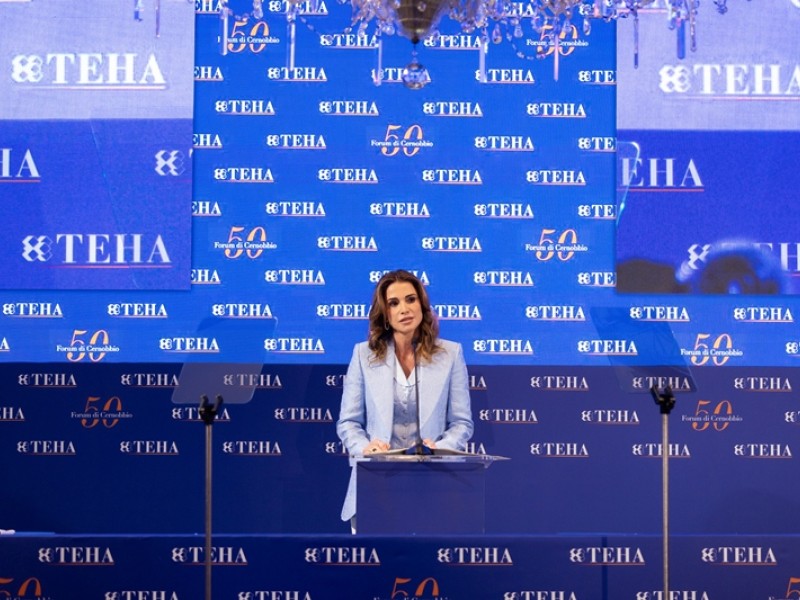Queen Rania’s Speech at the 2024 One Young World Summit - Montreal, Canada
Bismillah ar-Rahman ar-Rahim.
Thank you, Bob, for that very kind introduction. It is really good to be here in Montreal with you all.
Last fall, I had the pleasure of joining many of you at the summit in Belfast, marking 25 years since the end of the Northern Ireland conflict.
Our gathering was a celebration of peace – a reminder that even the bloodiest wars can be brought to a close.
But another conflict was weighing heavily on my mind: that between the Palestinians and Israelis.
I shared with you my concerns that, 57 years into an illegal Israeli occupation, the world had lost interest in the fate of the Palestinian people – that it was taking no action to stop escalating attacks on Palestinian land, rights, and identity.
I’m sure some of you wondered what this had to do with you. After all, there is no shortage of global crises vying for your attention.
But I felt compelled to highlight this particular conflict, because, in the Occupied Palestinian Territories, a new precedent was being set.
Israeli annexation of Palestinian land, the blockade of the Gaza Strip, settler attacks in the West Bank… Oppression and injustice were being folded into our world order, with great implications for the future you stand to inherit.
Still, as I looked out at the summit audience, I couldn’t help but feel energized.
I said then, “Hope is a choice.” And I dared to believe better choices were on the horizon.
Five days later, on October 7th, Israelis and Palestinians awoke to a horrific new reality.
And, every day since, hope has become a more difficult choice to make.
Today is World Peace Day. And here we are again: gathering on a day dedicated to peace, forced to discuss the reality of war.
Bloodshed between Palestinians and Israelis is not new.
But the world has been shocked by the scale and nature of the past year’s violence – first, on October 7th, in Hamas’ attack on Israelis, and the taking of hundreds of hostages… and then, for 350 days since, in Israel’s indiscriminate military campaign against Palestinians.
International humanitarian law prohibits collective punishment – but, in Gaza, collective punishment is the strategy. After all, a siege is scarcity by design: deprive every man, woman, and child of everything needed to sustain life, in the hope that famine, disease, and demoralization will lead to defeat – a strategy that is a brutal holdover from wars of past, amplified by modern-age weaponry.
Like so many around the world, I have watched Gaza’s destruction in horror. In January, when the International Court of Justice ordered Israel to prevent acts of genocide in Gaza, one-third of all buildings had already been damaged or destroyed.
That figure has since doubled.
Two out of every three buildings in Gaza are now uninhabitable. Homes, schools, hospitals, mosques, churches, water infrastructure, food warehouses, even orphanages have been targeted.
The devastation is compounded by a never-ending stream of Israeli evacuation orders. Nine out of 10 people in Gaza have been displaced at least once – some as many as 10 times.
Imagine, nearly 2 million people – more than the population of the city of Montreal – fleeing for their lives with little more than the clothes on their backs and their traumatized children in their arms.
Imagine families confined to overflowing tent cities, with 24,000 people to every square kilometer, and more than 4,000 to a toilet.
Gaza has long-been described as an open-air prison. Today, it is a suffocating cell.
With no water to drink, let alone wash your hands, illness spreads like wildfire: hepatitis, scabies, even polio – the territory’s first case in a quarter-century.
How can people survive under such harrowing conditions? The short answer is they can’t – at least, not for long. More than 41,000 Palestinians in Gaza are dead.
That figure includes at least 16,000 children. Over 20,000 more cannot be accounted for: lost, detained, buried under the rubble, or in mass graves.
Such suffering shouldn’t exist in this day and age; yet, scenes of mass exodus, starvation, and disease are being transplanted out of history books and onto our Instagram feeds.
This war has done more than set the Gaza Strip back generations. It is also dragging the rest of the world back to a level of lawlessness best left to the archives of history.
Worse yet, by sanctioning it – by continuing to provide military, economic, and diplomatic cover to Israel – many global powers are sending a chilling message about our future: that this is the shape of wars to come.
I said hope is a choice.
But in order to hope, people need the freedom to choose.
For most of us, our lives are defined by our choices. Each sets us down a slightly different path, and helps shape the people we will become.
Yet, under Israeli occupation, Palestinians’ capacity for choice has been stripped to the bone.
In the Gaza Strip, an entire generation has grown up knowing only limitations.
After 17 years under military blockade, and 12 months under near-total siege, they have run out of resources… out of stamina… and out of options. All that remains are impossible choices that only add insult to injury:
Do they take refuge in overcrowded, unprotected tent cities, or stay put and risk being killed at home? Do they allow their thirsty children to drink contaminated water, or deny them even that temporary relief? Do they risk their lives retrieving the bodies of loved ones beneath the rubble, or leave them to decay where they fell?
When I look at Gaza today, every choice I see is counterfeit. A quick death, by bombs and bullets, or a slow one, from hunger and disease. No possibilities – only inevitabilities.
These are not choices at all.
Even outside of Gaza, the Israeli state exerts control over nearly every aspect of Palestinian life. In the West Bank, Palestinians come up against arbitrary restrictions on both the most trivial and consequential of questions: Where they can live. Which roads they can use. What they can buy. Where they can pray.
When a population is denied meaningful choices, they are obstructed from meaningful progress. Their political, economic, and social development suffer. Their growth is stunted… their potential suppressed.
The Palestinian population is remarkably young; more than 70 percent of Gazans are under 30. Like all of you, those young men and women seek lives of purpose. But to achieve that, they must be free to chart their own paths.
Without genuine autonomy, their humanity is diminished – their aspirations kept out of reach.
I have always been – and remain – a firm believer that our outlook can shape our experiences. The first step to creating a better future is believing it is possible. But, after a year of heartache, disillusionment, and shifting perspectives, I’d like to amend my original statement.
Hope is a choice. And hope is essential. But it isn’t—and has never been—enough.
The persecuted and downtrodden don’t need a change in mindset. They need a change in circumstances—and need it now.
Over the months, Palestinians in Gaza have been subjected to subhuman conditions. Every day, a new unimaginable tragedy: Babies found dead in their hospital beds two weeks after doctors were forced to leave at gunpoint. A young man with Down Syndrome mauled by a military canine and left to die alone. Palestinian prisoners released after months of arbitrary detention, limping, emaciated, and describing inconceivable torture.
Yet, at the very moment when swift action is most needed, our global community has dragged its feet.
This cannot continue.
Archbishop Desmond Tutu once said, “In the face of human suffering, our own discomfort must be a call to action, not an excuse for inaction.”
Beyond just hope, it is time for impatience. We need to demand something different.
Not a temporary pause in hostilities… not a return to a broken status quo… but a genuine, just peace, built on universal respect for dignity, decency, and self-determination.
To do so, we must return to the root of this conflict: the illegal occupation of Palestine.
Recently, both the International Court of Justice and UN General Assembly have reaffirmed what many of us have long known to be true: Israel’s presence on occupied Palestinian land is unlawful, and it must end.
We cannot permit international law, legally binding Security Council resolutions, and the findings of world courts to be disregarded in favor of political expediency. We cannot allow voices from the extreme to steer us astray.
Peace is not a matter of chance. Peace, like hope, is a matter of choice – one our world has failed to make for far too long.
It is time to choose another way. And your generation can help pave it.
One of the few bright spots of the past year has come from young people just like you: informed, compassionate individuals, determined to call out injustice, wherever it may occur. Students, activists, and youth leaders on every continent – many with no personal connection to the Middle East – have adopted the Palestinian cause as their own.
Despite strong headwinds, they have chosen to take a stand for the choice-less. And that decision, like every decision, has slightly altered our world’s path.
The shift may yet be imperceptible. But, inch by inch, a course correction toward justice is possible. In fact, it is already underway. From streets to university campuses to the world’s highest courts, Palestinians’ equal claim to life and liberty has been reaffirmed again and again.
Now, we need to keep pushing. For the people of Palestine, but also for ourselves.
Palestinians, Israelis, and all of us deserve a world grounded in fairness and equality, where the rule of law prevails over the rule of might.
We deserve a global system that meets war crimes and wrongdoing with repercussions, not exceptions.
We deserve to know that our value is determined not by the passport we hold or the color of our skin, but on the basis of our humanity itself.
Today, you come to these issues with fresh eyes, unburdened by historical biases. You can choose to set your sights on the unvarnished truth.
So I urge you to read about the history of this conflict. Try to imagine the reality of life under a crushing occupation. Learn about Palestinians’ deep-rooted ties to the land and olive trees of their ancestors. Talk to people from the region about what a just peace would mean to them.
Question the established narrative…draw your own, more nuanced conclusions… and help nudge the world in the right direction.
With every rising generation comes a new opportunity to get it right… and we haven’t a moment to spare.
Your agency is your strength; so, make the most of the choices you are given. I encourage you, not to blindly hope for a better future, but to actively create it… to lend your voice to those who have been silenced… and to defend justice against all those who would see it undone.
Remember, standing still is not an option. Our world is in constant motion – either we all go forward, or we all go back. As Angela Davis put it, “we must learn to lift as we climb.”
Some of your choices will be difficult. But many of the most consequential questions have surprisingly simple answers.
Will you stand for order or chaos? For accountability or impunity? For life or death?
Will you choose to see the Palestinian people as just that – people – or as lesser beings, unworthy of the human rights to which we are all entitled?
The choice is yours. And that choice will be your legacy.
Thank you all very much.
Featured
Queen Rania's official website
This website does not support old browsers. To view this website, Please upgrade your browser to IE 9 or greater
Your browser is out of date. It has known security flaws and may not display all features of this and other websites. Learn how to update your browser



